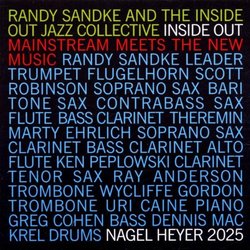| All Artists: Randy Sandke Title: Inside Out Members Wishing: 1 Total Copies: 0 Label: Nagel-Heyer Germany Original Release Date: 1/1/2002 Re-Release Date: 7/16/2002 Genres: Jazz, Pop Style: Number of Discs: 1 SwapaCD Credits: 1 UPCs: 645347202528, 675754617325 |
Search - Randy Sandke :: Inside Out
 | Randy Sandke Inside Out Genres: Jazz, Pop
|
Larger Image |
CD Details |
CD ReviewsIncredible Musicianship Douglas T Martin | 07/24/2002 (5 out of 5 stars) "Randy Sandke's talent and versatility have never been better showcased than on this new CD. With one exception (an Ellington cover) all the cuts are compositions by members of the group, and you're getting a full range of great jazz musicianship here. I've been one of Sandke's biggest fans for about thirteen years now, and this guy just gets better and better." Inside Out: Mainstream Meets The New Music Douglas T Martin | Alpharetta, GA USA | 08/01/2004 (5 out of 5 stars) "The nonet has never been one of the favored jazz ensembles. A nine-piece band falls into that area where the collective is too big to be a combo, but too small to be a big band. Joe Lovano has had a lot of success with his Nonet (two acclaimed recordings so far) and if this were truly a just world, trumpeter and bandleader Randy Sandke would be getting similar recognition with his 9-piece Inside Out Jazz Collective. Recorded in 2000 for the Nagel Heyer label (released in 2002), "Inside Out" is a tour-de-force of writing, arranging, and performing. Sandke, who has interpreted Louis Armstrong and Bix Beiderbecke on earlier recordings, brings some of the most creative people in modern jazz together to create something new, with a hint of something old.
First up is Marty Ehrlich's "Like I Said", with a muscular arrangement that breaks up the horns into different groups and employs multiple melodic lines to great effect. Although he doesn't solo on this track, baritone saxophonist Scott Robinson gets in some great low-register riffs. The only tune not contributed by a band member, Duke Ellington's "Creole Love Call", a lazy blues, finds Robinson switching to theremin and playing a brief solo that sounds like a ghostly French horn. Drumer Dennis Mackerel (of the Count Basie Orchestra and the Village Vanguard Orchestra) contributes the song "Simple Pleasure", a bright, yet soulful number that gives Ken Peplowski a chance to let loose with a ripping clarinet solo. "Comet Call" by Scott Robinson just smokes - powerful drumming drives this swinging bop piece. The highlight of the recording (for me) occurs when the rest of the band drops out, leaving Robinson's baritone sax and Mackerel's drums to carry the tune; the band rejoins the duo to support Robinson's solo before dropping out again to showcase Mackerel. Scott Robinson is the MVP of this date, playing soprano, baritone, and contrabass saxes - as well as flute, bass clarinet, and theremin. The contrabass sax shows up on Sandke's appropriately named "Plumbing the Depths", a vaguely Middle-Eastern type of number where Robinson's contrabass sax lumbers along like a drunk trying to find his way through his house in the dark without being detected. "Plumbing" is the aural equivalent of watching Otis Campbell lock himself up after a night of drinking (it'd make a great soundtrack). Trombonist Ray Anderson's "Sisyphus Effect" is an enthusiastic meeting of jump-blues and Dixieland that features the brass section, with Anderson, Sandke, and trombonist Wycliffe Gordon getting both room to solo and a chance to trade riffs with each other. Gordon also stages his composition "Sam Bone" as a trombone feature for himself and Anderson, with pianist Uri Caine and drummer Mackerel also getting some solo time on this swinging number - one that wouldn't sound out of place on a Thad Jones/Mel Lewis recording. The recording closes out with bassist Greg Cohen's "Trapianti di Scimmia", a alternately smooth and perky bossa nova that features Ken Peplowski's clarinet. If this was an experiment, "Inside Out" must have been an unqualified success. Randy Sandke shows that the modern and traditional can be merged without losing the essense of either. If you have adventurous ears, then give this one a listen." |

 Track Listings (12) - Disc #1
Track Listings (12) - Disc #1